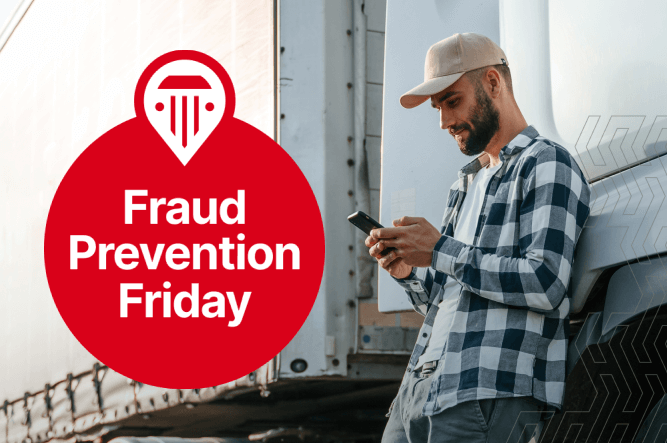How Carriers Can Spot and Report Double-Brokering
Truckstop Fraud Prevention Friday outlines signs of potential double-brokering behavior and how to report double-brokering if it happens to you
The freight market has been experiencing significant challenges over the past few years. From historically high rates to recession conditions, the drastic changes in the supply chain and reliance on technology to connect drivers to loads has created opportunity for fraud and bad actors.
One of the most prevalent scams is double-brokering, the unauthorized transfer of a load from one freight broker to another without the knowledge or consent of the shipper. While it can sometimes be a result of negligence or poor communication, in most cases it’s an act of malicious fraud. And the increase in double-brokering scams is staggering. In Q4 of 2022 and Q1 of 2023, Truckstop saw a 400% increase in complaints regarding double-brokering in the industry.
As a carrier, there are things you can do to identify double-brokering and protect your business and reputation before you’re unknowingly entangled in fraud. We have outlined signs of potential double-brokering behavior and how to report double-brokering if it happens to you.
Ways to Identify Double-Brokering
Double-brokering can impact carriers directly by reducing their profit margins, creating inefficiencies in load management, and potentially leading to payment disputes or service quality issues. But with due diligence you can avoid double-brokering scams.
Here are some common signs of double brokerage:
- Reposted loads. When you’re checking load boards for your next haul, keep an eye out for that load reposted again somewhere else for a lower price. For example, you might see a load for x amount of dollars appear, then as soon as it’s been contracted, it appears somewhere else for $400 below the original offer. This is a red flag for fraudulent behavior.
- Conflicting information. If you’ve been asked to check in at a shipper under a name other than your own, warning bells should go off. You might also see another carrier’s name on the Bill of Lading, and/or a completely different broker’s name. If the details aren’t consistent, ask questions and confirm legitimacy.
- Unusually high payments. Scam brokers frequently register as carriers first. They’ll accept a load, then repost it as a broker, offering more money to help a different carrier to haul them. But when it’s time to be paid, it never comes through and the business address has been changed one that is untraceable and the phone number is disconnected—leading to a dead end. If a deal seems too good to be true, dig deeper to ensure you aren’t accepting work from a scammer.
- Inconsistent contact details. Just like brokers vet carriers, carriers should verify brokers as well. If a broker isn’t registered or has incomplete information in an FMCSA search, warning bells should go off. Be aware, this does not guarantee against fraudsters. Legitimate company details have been known to be spoofed, creating confusion and deception for carriers.
How to Report Double-Brokering
If you have been scammed through double brokerage, report it right away. Here are the first six steps you should take to minimize the impact.
- Contact law enforcement. Your first step should be to notify local authorities of the incident with as much detail as possible.
- Communicate with all parties involved. Open lines of communication with the broker and shipper are essential. If you used a load board, notify them as well so they can work to track down details like the IP address so they can deactivate the scammer(s).
- Notify your insurance company. Double-brokering could result in a lack of insurance coverage if something happens to the cargo. Alert your insurance company so they aware of what’s happening.
- File a claim. If you have not been paid for a load, file a claim against the surety bond of the freight broker. This usually results in a small payment, which can at least tide you over.
- File a formal complaint with the FMCSA. Double-brokering complaints usually fall under Deceptive Business Practice or Operating Authority and Financial Responsibility. Filing with the Federal Motor Carrier Safety Administration helps protect your authority to keep your business running.
- Report fraud to the DOT Office of the Inspector General. This process isn’t difficult and helps protect you and others from being scammed from the same person in the future. Flagging the DOT may help expedite action.
FAQ About Double-Brokering
Here are a few frequently asked questions about double-brokering:
- What’s the difference between double-brokering and co-brokering? The biggest difference is communication. Double-brokering occurs without the shipper’s knowledge, resulting in a breach of contract. Co-brokering is worked out beforehand and written in the agreed-upon contract. It involves multiple brokers and carriers working legally with the original shipper to transport a load. Payment for the completed haul is divided among the parties according to agreed-upon contract terms.
- Why is double-brokering illegal? Double-brokering is illegal because it violates the terms of service. It also creates liability for unsuspecting parties, nullifies insurance coverage, and can deceive carriers into delivering loads without payment.
- What’s the best way to avoid double-brokering? The best way to avoid double-brokering is to do your due diligence. Utilize tools like a trusted load board, read and verify documents, and don’t hesitate to ask questions. Going the extra mile can help safeguard your business against those with malicious intent.
Category: Driver Stuff, Equipment, Featured, Fleet Tracking, General Update, Management, News, Safety, Training











